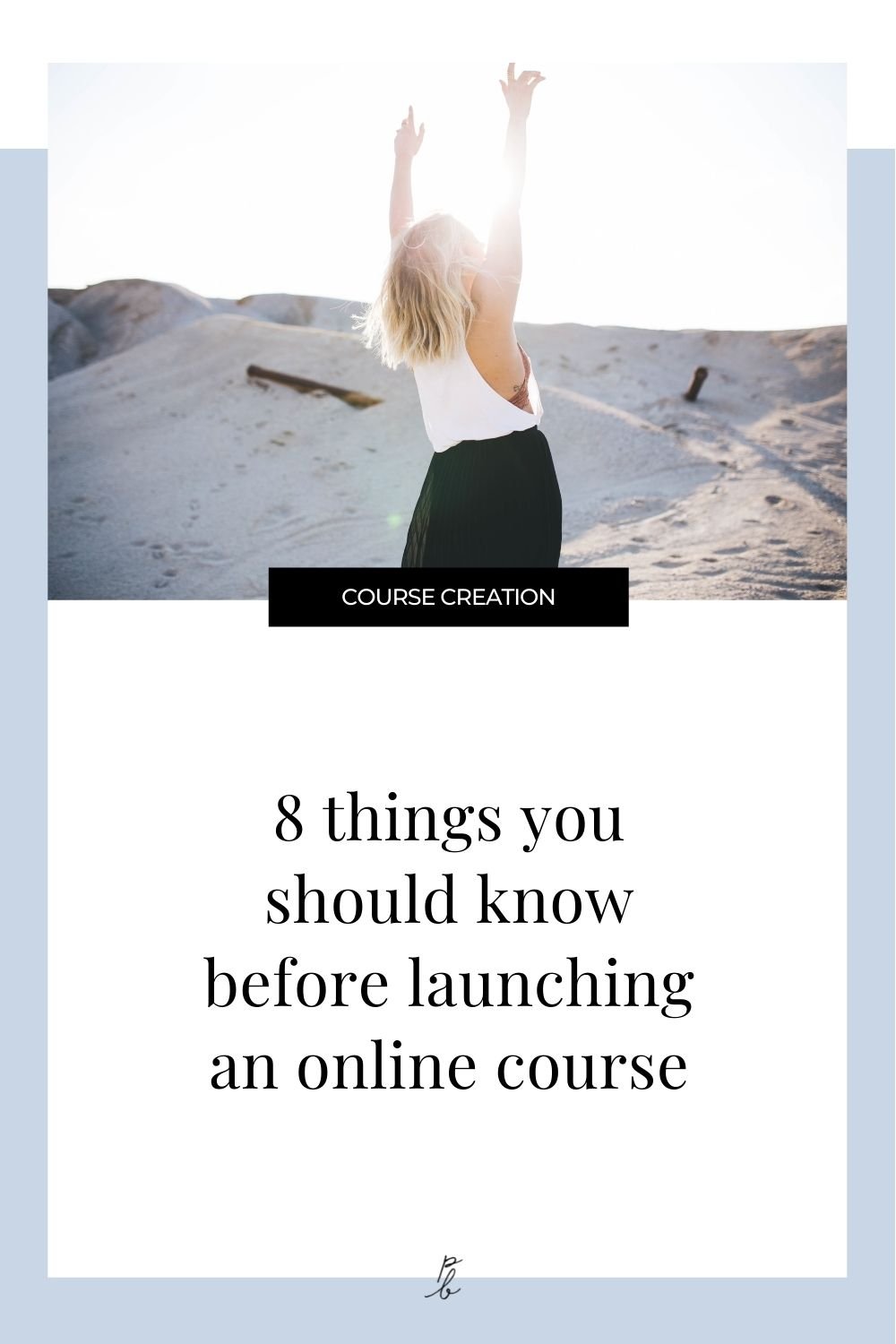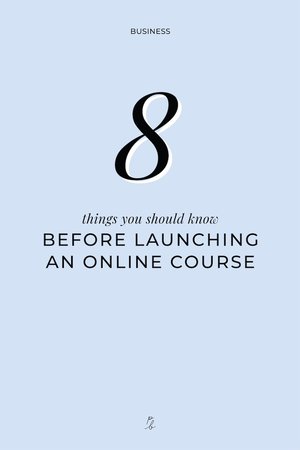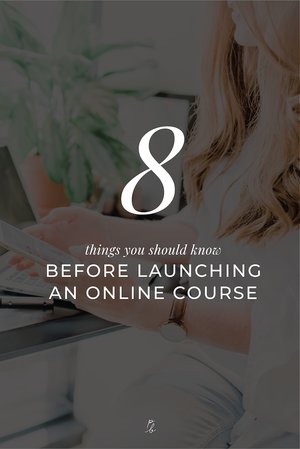8 things you should know before launching an online course
So you’re currently dreaming about sharing your expert knowledge all packaged up into a little online course bundle… 🎁
Perfect! Online courses truly are an exceptionally wonderful resource for those who need them and a fabulous income stream for you.
The ‘student’ side of me is def a fan!
Every time I go to learn something new (affiliate marketing, Youtube, Facebook Ads, podcasting, etc.) I find thee go-to expert on the topic and go buy a course from them on it.
Time and time again, it’s allowed me to completely skip over over all the fumbling around and the noise and get going on my project as efficiently as possible. 💪
Now that I’m on the other side of the coin, being the course creator myself and having built 3 (soon 4) online courses and coaching programs, nearing the $2M mark in online sales, I can also confidently say that they’re such a life-giving stream of income in a business too!
They share your expertise with your audience in a manner that feels very personalized, while still allowing you freedom to not be chained to a laptop all day.
Online courses really are a win-win as both a consumer and as a course creator.
Now, I take it you’re reading this because you want to hop over onto the course creator side. 🏃♀️
And good news, because I’ve learned a thing or two from launching my online courses, and I’m going to spill ALL the beans with you in this post.
Some of what I’m about to tell you I think you’ll be super pleased and delighted to learn.
Other bits of info I know you might not really want to hear, but know it will be the best for you in the long-run if you hear it up front.
NEW Course Creator Coaching Program!
Coming soon! Join the waitlist to be the first to hear when applications open! 👇
8 things you should know before launching an online course
1. You NEED an email list
Let me be super clear, I’m not saying an email list ‘might be beneficial,’ or ‘could help with sales’.
No. You NEED an email list.
If you do not have an email list, legitimately don’t bother yet thinking about building your online course.
(Sorry to be blunt, but truly, it’s best you know this. I don’t want you to join the ranks of the many people who have spent months building a course only to launch it and land 0 sales.)
I was in Mariah Coz’s Accelerator program where there were a few of us going through the course building and launching process together.
One girl has 25k Instagram followers. Another had quite a few thousand YouTube subscribers. I had an email list of 2k. Who got the most sales? I did, by farrrrr!
Wondering how big your email list needs to be before you launch?🧐
This post breaks that down with an exact calculation which will help you determine how much you’ll bring in in revenue based on how big your email list is.
2. Choose an all-in-one course hosting platform (they're worth it)
When I got started with my course, I seriously considered hosting the course on my Squarespace site.
I mean why not? I’m a Squarespace lover through-and-through, I can make the course look and feel v ‘on-brand,’ and I already pay for a subscription to it…
…so why shouldn’t I try to save a couple extra bucks a month while bootstrapping my new idea?
Turns out, the course building AND making a marketing plan AND implementing it SO much work, I decided to make my life easier by going with a system to host my course which was intended for hosting course so I wasn’t constantly having to find workarounds to features I would need inside the course.
Hoo boy am I glad I did. 😅
Believe me, committing to a course hosting platform which doesn’t come cheap was not an easy decision seeing as I hadn’t yet really tested my course or sold it to a single student yet.
But looking back, it was absolutely the right decision.
HERE’s WHAT MY COURSE-HOSTING PLATFORM DOES THAT MY WEBSITE CAN’T:
Auto-reminds students who have had payment plan payments fail (this happens with manyyy students, every. single. month!)
Auto-unenrolls students who haven’t updated their payment information after 4 attempts to get them to pay (such a time saver!)
Ability to see each student’s progress through the course
Gives each student an individual login
Gives students the ability to fix password issues (ie. forgetting it or needing to change it) without needing to get in contact with us (which is slow and annoying for the student and adds a lot of work on our part)
Integrates with my email list and email marketing software automatically so I can send course-related emails just to students to update them when there’s new course content, when live Q+A calls are coming up, when I want to hear all about their success in testimonial-form and when I want to get course feedback to help me improve my courses!
Has a checkout system integrated which means I can take all course payments through the one platform, which then makes enrolling students super easy.
The alternative would be to set up some sort of automation between a checkout cart and the course platform to get students enrolled and given login info after they pay.
Can host videos without having to first upload them to some other video hosting software and then embedding their player on the page.
They automatically handle VAT and other random taxes that relate only to specific countries and regions for me so I don’t have to pay a super expensive international tax guru to make sure I’m in good standing with every country’s tax people.
You can find my full list of reasons for choosing a dedicated course hosting platform over using my existing website in this post: Should I host an online course on Squarespace? No! Here's why…
(Yes, I still feel this way EVEN after Squarespace came out with their Member Areas feature, and here’s why: Building a membership site? (Squarespace Member Areas vs. Teachable)
Basically, course hosting platforms are intended for that purpose specifically, and because courses have so many moving parts to them, I wouldn’t dream of hacking some other system together.
There truly is a price for simplicity and making your life easy as an entrepreneur. So yeah, a course platform is a necessary expense in my books.
I use Teachable. I’d say I’m 96% happy with Teachable. My only annoyance with them is that they have too many options when it comes to how you take payments and the fees associated with those different options. Other than that, I’m a happy, paying customer. 👍
Pssst! Wanna Pin for later?
3. Don't number your videos!
My gosh am I pleased someone warned me about this before I recorded my first course video!
I had been talking to another course creator at my coworking space and he warned me about this one the night before I recorded my first video.
And I had absolutely intended to do something like a slide at the beginning saying ‘Module 4, Video 3’ for each video.
Here’s the thing, no matter how much planning you do, while you’re creating your course, you can bet. your bottom dollar that you that you’re going to have something important pop into your head where you think “oh man, I need to add X to the course or everything else I teach won’t make sense.”
You then create a new video and stick it in the middle of a module, totally messing up your numbering system.
Or, if that doesn’t happen (which believe me, it likely will) at some point in the future you’re going to need to update the content of your course, and that’ll throw off the video numbers too.
Bottom line, don’t number your videos or you’ll put yourself in a real pickle of a situation.
4. Know that not every course needs a Facebook community
I’ll be honest with you, running Facebook communities is a LOT of work. For some courses, I do think they’re really beneficial. For others, they’re not super necessary.
And there’s quite a few headaches you run into once you start them.
Here’s a few you might not have thought of:
If you start a Facebook community that has no expiration date, the cost of maintaining it (ie. hiring a community manager or moderator) is an ongoing cost foreverrr.
While you do make a profit on new students, a good number of your future sales are basically just funding the cost of maintaining the group and paying your community manager.
You’re basically running a membership without the benefit of getting ongoing income from members. 🤷♀️
If you start with a Facebook community that’s unlimited (again, has no expiration) if you ever change your mind—like deciding you don’t want to still talking about watercolor painting, or whatever your topic is, 7 years from now—it’s going to be hard to take it away and break that to your students.
If you start a Facebook community that IS time-bound and has a firm end date, people will complain that the length of time is not long enough.
I tested this, and Parkinson's law absolutely proved true.
I did a FB group for 4 weeks…students said they needed another week. I did the next group for 5 weeks…students said they needed another week.
I quickly learned that no matter how many weeks I ran the group for, students always needed a week longer.
You could however take this knowledge and offer a group for 4 weeks while fully planning to extend it to 5 weeks if you have your heart set on offering a Facebook group.
If you answer questions in the Facebook community, you suddenly become a 24/7 help line, 365 days a year (including Christmas, your birthday, etc.) You need to login to FB every day and you need to always have a FB account (Wanna do a social media detox? No can do.)
If you don’t answer questions in the Facebook community and it’s more a place for students to connect, you still need to manage it which should not be underestimated for how much work that is to stop spammy posts, people self-promoting, follow threads, dealing with Negative Nancys, etc.
Students will start friend requesting you and you either feel guilty for not accepting, or you accept and then people start sending you questions via FB messenger and you become a support line via your personal Facebook
So yeah . . . just think really carefully about how you’ll run a FB group before you start one. If you think it really adds to your course, by all means do one, but I hope those lesser-known downsides help you make an informed decision!
5. Enrollment urgency is a necessity
I’m about to get fancy with a graph for your here to demonstrate this point as clearly as I can.
You need to force a decision to be made.
The decision can be “no, I don’t want to buy that course, I don’t think it’s the answer to my problem” and honestly, that’s totally A-Okay. I truly don’t want to be forcing stuff on my audience that won’t benefit them and their business.
The decision can also be “yes, I want to buy that course, I genuinely think it will help me solve X problem.”
The worst thing you can do, both for yourself and your customer who is struggling with an issue that your course would help them to overcome is to let them push the decision off.
“Hmm, looks good. I’ll keep that in mind and bookmark it to maybe buy later.” (Later NEVER comes, P.S.)
K, so take a look at the dates and times of the sales during one of my launches.
The launch was 1 week long… Notice something?
Let me break it down for you.
Open cart: Right when I opened the art, there were a few buyers. People had been waiting for my course, knew it would help them and were excited to get started ASAP.
Early bird: Then, during the early bird period when there was a discount, people were buying pretty consistently. The urgency was “if I decide to enroll now, I’ll get a discount. If I decide to enroll later, I won’t.”
Early bird cart closing: Then justttt before the early bird, discounted cart closed (and the regular priced cart opened), there were a flurry of sales. “This is my last chance to get the course at this price!” people think.
Webinars with fast-action bonuses: Then, the next bunch of sales tend to happen during one of my webinars when I give a fast-action bonus. I give some additional something to students who enroll within a certain number of hours of the webinar. Again, it’s time-bound to a few hours. Students enroll because they get an added something for making a decision then. Same thing for the second webinar.
Final cart closing: And then the final bunch of sales happen just before the cart closes for good. Those people think “if I don’t get in now, I’ll have to wait months or a year to get in!”
Now, notice how few sales happened NOT during one of those periods I mentioned?
Now imagine I had no urgency, no price increase, no webinar fast-action bonuses, no close cart…I would have gotten a tiny fraction of sales, and would have helped a tiny fraction of students.
Urgency is a necessity.
(By the way, this is just a chart from one launch, but this is the norm over manyyy launches I’ve run now. My team and I can predict with pretty crazy accuracy now on which days and times we’ll get a lot of sales and we no longer freak out on the days there’s no sales, as we totally expect that on the days no urgency is taking place.)
6. Bonuses don't drive sales nearly as much as discounts do
There’s honestly not a ton to say on this, so I’ll keep it short.
Basically, discounts will drive sales a lot more than adding free bonuses on will. And bonuses take a lot longer to create, and involve a lot more work to deliver on that just the promise of a savings.
Granted, you need to be seriously careful with constant discounts so you don’t destroy the perceived value of your product.
7. You need to send a LOT of emails
In a launch we normally do 2-3 emails before enrollment opens to build anticipation, then another 9-11 emails during the 7 day enrollment period.
Don’t be afraid to send emails, they are the foundation of a course launch!
If you’re worried about your email list hating you for so many emails, you can always add an option at the bottom of your emails so subscribers can opt-out of that launches sales emails but continue to stay on your list for future free, fab content.
Not sure what to say in your launch emails?
Hop on the Course Creator Coaching Program Waitlist to be the first to know when applications open, so you can get the support you need for building and launching your first online course with a bang!
8. Launch before you’re ready
What happens when we’re wandering into unknown territory or doing something we’re a bit scared of (like launching a course)?
We put a heck of a lot of unnecessary tasks between us and launch.
You don’t need an affiliate program to launch your first course. You don’t need the perfect social media graphics. You don’t need some wild promo video. You don’t need your blog to hit a certain number of page views or to be connected with every influencer in your industry…
Here’s what you actually need in order to launch:
A thought-out course idea & plan to create it (the course doesn’t actually need to be finished)
An email list (to figure out the size of email list needed, read this post)
A sales page (can be a minimal viable one, doesn’t need every bell and whistle in the book)
A secure and simple way to automatically take payments
Terms and conditions of online course sale contract in place
(I bought my terms and conditions of course sale from the Creative Law Shop here. I’m also now an affiliate of the shop! If you use the code PAIGE10, you’ll get 10% off any shop contract and I’ll make a commission. My margarita fund thanks you! 🍹)
If you currently have something on your to-do list which is not on that list above, maybe ask yourself if you’re just scared of launching and are putting it off by adding more things to your to do list.
It’s a pretty common trap we fall into (myself included), but being aware of it definitely helps us from getting in our own way.
So there you have it! 8 things I really wish I had been aware of these things before I got started with my own online courses! Wish you could get a little more ‘hands on’ help with building and launching your first or next course idea?







